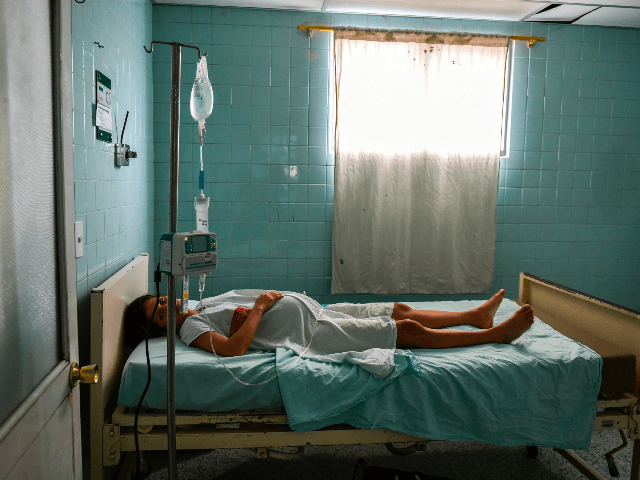5VTV, Venezuela’s socialist state propaganda outlet, promoted a social program on Thursday called the “Humanized Childbirth” initiative, which dictator Nicolás Maduro claimed would grant mothers “childbirth without pain.”
VTV specifically celebrated the fact that women now have access to the program through the Carnet de la Patria (“Fatherland Card”), a social credit system developed by China’s ZTE telecommunications firm, according to a Reuters report. Maduro forces Venezuelans to use the “Fatherland Land” for purchases of basic goods, gasoline, medical care, and other necessary activity in life, which allows Caracas to individually track the behavior of every citizen. Those without the “Fatherland Card” cannot access the little food and government services Maduro provides.
“In Venezuela, the Fatherland Card protects 818,000 women,” VTV claimed. “349,000 in Material Lactation and 469,000 through the Humanized Childbirth [program].”
Maduro announced these numbers at an event celebrating three years of the imposition of the “Fatherland Card” surveillance system on the Venezuelan people, VTV noted.
“Humanized Childbirth,” it went on to explain, was a program to “empower and protect women.” The report did not specify what exactly the program did to help pregnant women, but quoted Maduro’s remarks from when the program was first announced years ago.
“I will launch the National Plan for Humanized Childbirth, for childbirth without pain, to support and help them [new mothers],” Maduro said at the time. “So that they have a happy childbirth, a healthy, happy, human gestation. That is why we have to constitutionalize all these missions so that nobody can ever privatize the rights of Venezuelans.”
Maduro put the “Humanized Childbirth” plan into action in July 2017, at the time regarded as a program for “communitarian accompaniment” for women having babies. The plan resulted in a constitutional amendment reading, “the State must guarantee protection and assistance for maternity from [the moment of] conception, during the pregnancy, and at childbirth.”
The only concrete plan apparently resulting from this amendment was a national propaganda campaign to raise awareness for its existence – the government hired 10,000 “promoters,” all women, to visit communities and tell women that the government had passed a law to benefit them during maternity. The promoters would then register the women for the Fatherland Card, a surveillance tool. In theory, registering as pregnant through the Fatherland Card would yield more food and money than non-pregnant women would receive.
The Fatherland Card is not a new program. The program debuted in 2014 as a ration card to keep Venezuelans from buying what they needed for their families at supermarkets. At the time, inflation in Venezuela was at 60 percent and rapidly rising, alarming Maduro’s regime. Currently, the inflation rate is estimated to be around 10 million percent.
At the time of the first ration cards, stocks of basic food goods such as vegetable oil, wheat flour, milk, coffee, sugar, canned sardines, pork, and butter began to become difficult to find in supermarkets. As a backup to the new ration card system, Maduro ordered all supermarket owners to install fingerprint scanners to ensure Venezuelans did not purchase more than their allotted limits of food for any given day.
By 2017, a significant percentage of Venezuelans were eating from trash heaps in Caracas, unable to find food at supermarkets, as a result of Maduro’s socialist economic policy. That year, Reuters reported, Maduro spent $70 million to upgrading internet surveillance and the use of the Fatherland Card for surveillance, turning it into a rudimentary version of China’s “social credit system,” which allots point scores to every citizen based on loyalty to the Communist Party. The card, in addition to serving as a ration card, then began documenting “birthdays, family information, employment and income, property owned, medical history, state benefits received, presence on social media, membership of a political party and whether a person voted.”
The collapse of Venezuela’s economy brought with it a collapse in the healthcare system, which late dictator Hugo Chávez had nationalized. Currently, Venezuela lacks supplies of nearly every single drug the World Health Organization (WHO) lists as necessary for a functional healthcare system, from common painkillers like acetaminophen to birth control bills to expensive cancer and HIV drugs. Venezuela’s maternity wards, like every other part of the nation’s hospitals, lack both cleaning and medical supplies and basic items to clean the hospitals, like cleaning liquids and even water. The result is routine infections that kill infants. Among the most notorious was the socialist healthcare system’s mass killing of 17 newborns at a maternity ward in Anzoátegui state, where an opossum infestation had left the nursery full of dangerous animal waste. Doctors lamented that they had no way of disinfecting the ward or cleaning up the opossum waste, much less actually ending the pest infestation.
More recently, Univisión published shocking images from a nursery in the city of Maracay that had run out of bassinets and was storing newborns in cardboard boxes.
Maternity wards are largely overpopulated partially because of the lack of birth control. By 2016, reports began surfacing of a teen pregnancy crisis. As schools have also largely shut down – with no food, electricity, or basic school necessities available – the rate of teen pregnancy has skyrocketed.
Experts also believe that maternal mortality rates have risen. Between 2015 and 2016, the maternal mortality rate nationwide increased by 66 percent. Maduro then ordered health officials to stop publishing that statistic, leaving the world in the dark on how many women are dying in childbirth in Venezuela.



COMMENTS
Please let us know if you're having issues with commenting.